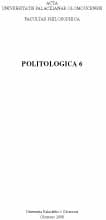Využití Millových metod ve srovnávací politologii: metodologické předpoklady a problémy
The Application of the Mill's Methods in Comparative Political Science: Methodological Assumptions and Problems
Author(s): Karel KoubaSubject(s): Politics / Political Sciences
Published by: Univerzita Palackého v Olomouci
Keywords: John Stuart Mill; Method of Agreement; Method of Difference; Political Science Methodology; Qualitative Research; Comparative Politics
Summary/Abstract: The application of the so called Mill’s methods in comparative political science research has recently become a controversial methodological issue. This article attempts to delineate the proper research situations in which the use of these methods is justifiable. It does so by analyzing the rather strong methodological assumptions which underlie their use in non-experimental research settings. First, the original formulations of the methods of difference and agreement are introduced together with their more recent extensions. Second, some existing political science research applications of both methods are discussed. Based on this analysis, four major methodological problems are identified: the practical impossibility of using experimental research design, problems stemming from the existence of multiple causation and interaction eff ects, and the ontologically deterministic view originating from the methods’ logic. Finally, the proper research settings in which they can be used are identified. The article concludes by stating that the use of Mill’s methods in comparative politics is justifiable only in certain research settings and only if the researcher has a firm grasp of their underlying assumptions and problems.
Journal: Politologica. Acta Universitatis Palackianae Olomucensis
- Issue Year: 2008
- Issue No: 6
- Page Range: 107-136
- Page Count: 30
- Language: Czech

